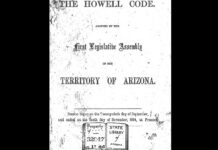
Taking a nontraditional approach, the Arizona State Housing Supply Study Committee, a bipartisan group commissioned by the Arizona State Legislature, met in Sedona to discuss housing issues both in and around the Verde Valley during its tour of the state to explore housing concerns with local communities.
Sedona city staff, along with officials from Prescott and Cottonwood, presented local information and perspectives to the committee representatives, who come from all over the state. Some of these committee members included Arizona State Rep. Steve Kaiser [R-District 15], Tempe Mayor Corey Woods, Arizona State Sen. Martín Quezada [D-District 29], and many others involved in the Arizona housing market.
“Sedona is one big dispersed hotel district, frankly, the way things are. So, it’s not a question of nuisances for us. It’s the lack of rental and residential inventory that is our major problem,” Mayor Sandy Moriarty said. “Our major issue is housing, affordable housing, always has been and always will be.”
For Housing Manager Shannon Boone — who works jointly for the cities of Sedona and Cottonwood — and Sedona Deputy City Manager Joanne Keene, along with all of the local residents who attended, this was the main topic of discussion. Given the large disparity between available housing options and the population of Sedona, the other cities in the Verde Valley have become a haven for Sedona workers.
“Sedona doesn’t have the land and the infrastructure to address the housing challenge on our own,” Boone said. “And we know that much of our workforce is a burden on the other cities and towns in the Verde Valley, hence the regional approach. So, the housing study that was commissioned provided us with a lot of data regarding the crisis in the Verde Valley.”
The overall housing cost burden for residents of the Verde Valley is 36.4%, while the state average sits at 29%. This is mainly due to the drastic rise in home prices since 2019. For Sedona, the rise of home prices from around $630,000 to $997,000 on average has destroyed a community where workers report a median annual income of $57,000.
“For the past six years, I’ve heard repeated laments from my parishioners and staff about the changing character of our neighborhoods and the lack of affordable housing in our community. Since the loss of locals and zoning control and increased short-term rentals, we’ve witnessed multiple issues across age and income demographics,” Sedona resident and St. Andrew’s Episcopal Church Rector Rev. Monica Whitaker said. “Our church has found it challenging to support young families in their faith journeys due to the lack of affordable housing. And unfortunately, they move away from the Verde Valley and Arizona.”
After hearing the cities’ representatives’ presentations and attending the public forum, the committee members will report their findings to the state legislature, in combination with the data from other communities they have visited.
“We respect that local jurisdiction is a thing and that they make the decisions based on what’s best for their individual community …. To me, it’s very concerning to hear that members of our workforce are living out of vans or that they’re having to live an hour away from where they work, that is a domino effect to disaster,” House Representative for District 29 Caesar Chaves said. “As somebody who lives in the city that loves to come up to Sedona, I cannot imagine coming up to a city where there is no workforce for there to be tourists …. All I ask moving forward is that the state can work with the city and that the city can continue to respect what their community wants.”


















